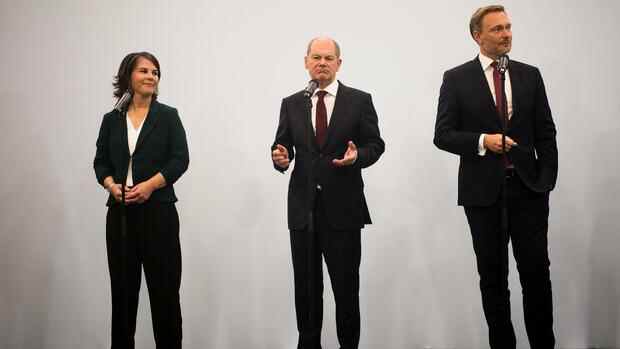Berlin With a view to a possible traffic light coalition, the SPD left is now making a push to finance the planned projects. “The traffic light should agree on the establishment of a public investment company, which could carry out these investments in compliance with the debt brake,” said Dierk Hirschel, member of the board of the SPD forum Democratic Left 21 and Verdi chief economist, the Handelsblatt. “This is where the decision is made as to whether a traffic light coalition can usher in a decade of modernization or not.”
Hirschel named additional public investments in climate protection, education, health, affordable housing and transport as central to Germany’s future. From a trade union point of view, an additional 50 billion euros are necessary for this every year. However, the debt brake prevents investments from being financed through loans. said the unionist.
The SPD member of the Bundestag Ralf Stegner spoke of “smart proposals”. At the same time he emphasized: “You don’t conduct coalition negotiations in public if you want them to be successful.” But nobody doubts “that we urgently need future investments – in climate neutrality, education and research, digitization and infrastructure,” Stegner told Handelsblatt.
In the upcoming coalition negotiations, the financial feasibility of the planned future investments is likely to become a central sticking point. These should succeed without tax increases. In a number of places, relief is even planned, for example through favorable depreciation conditions for companies.
Top jobs of the day
Find the best jobs now and
be notified by email.
Obvious financing options could not be made with the Liberals. They had enforced that taxes would not be raised and the debt brake would not be relaxed. “We will guarantee the necessary future investments within the framework of the constitutional debt brake,” it now only says in the exploratory paper of the SPD, FDP and the Greens. And: “We will not introduce any new taxes on assets.” The income, company or value added tax should not be increased.
The Rhineland-Palatinate Prime Minister Malu Dreyer (SPD) was nevertheless confident. “We discussed finances for a long time, and we strongly assume that in the end everything will be financially viable,” Dreyer told the Handelsblatt.
Economists open to bypassing the debt brake
The SPD politician also pointed out that in addition to all the necessary state investments, it was a matter of mobilizing private investments. “In order for companies to invest more in the future, we have to improve the framework conditions,” she said. “Faster planning and approval processes play just as important a role as better depreciation conditions.”
Alternatively, state investments could also be financed through loans without calling into question the debt brake established for the federal government in the Basic Law. Economists advocate the establishment of state investment companies that are allowed to take on debt outside of the debt brake, through which the state then finances higher investments.
The Ampel partners want to mobilize financial resources by cutting climate-damaging subsidies and other unnecessary government spending. “But that won’t be enough for the foreseeable future,” said Düsseldorf economist Jens Südekum. “That is why the coalition will have to make maximum use of the flexibility of the debt brake.”
In 2022, if the debt brake is still suspended, the traffic light will probably fill up a large reserve that will be melted down in the following years. At the same time, wherever possible, it will outsource public investments to special purpose vehicles that operate alongside the debt brake, explained Südekum.
“FDP remains a social security risk for employees”
The devil in finances is in the details, said the President of the German Institute for Economic Research (DIW), Marcel Fratzscher. “Because it has to be clarified how significantly more future investments can be made without tax increases and while adhering to the debt brake,” said Fratzscher.
The question of how the framework conditions for private investments can be strengthened should also be clarified. “The coalition negotiations will be about making these promises more concrete and avoiding lazy compromises,” explains the DIW boss.
Jessica Rosenthal, federal chairwoman of the Jusos – the youth organization of the SPD, was also critical of the financial aspects of the paper. “What we can’t understand is how the investment is going to be paid for in the end and why the redistributive issues that are important to us aren’t there,” she told news channel Phoenix.
The SPD-Linke Hirschel accused the FDP of blocking urgently needed additional tax revenues through its “tax policy management of wealth”, which could be used for better care, more teachers and good administration. “That is why the liberals are the social brake on progress in the traffic light,” said the former candidate for the SPD federal chairmanship.
Hirschel described the expansion of the mini and mid-job limits called for by the FDP as “highly problematic”. “The promotion of these precarious jobs destroys regular social security jobs,” said the unionist. Another critical factor is “the intended erosion of the Working Hours Act by so-called experiment rooms”.
Hirschel also considers the announced entry into a capital coverage of the statutory pension to be “completely unacceptable”. The pay-as-you-go system is crisis-proof, he emphasized. “Lindner & Co must not damage the statutory pension any further,” he warned. “The FDP remains a social security risk for employees.”
The Verdi chief economist also sees positive aspects. “The increase in the minimum wage to 12 euros in the first year of government is a great success,” said Hirschel. This would increase the wages of ten million employees by a quarter. The stabilization of the pension level at 48 percent and the exclusion of a higher retirement age are also to be assessed positively from the employee’s point of view. “Here the SPD has prevailed.”
More: The original joint paper on the result of the traffic light explorations
